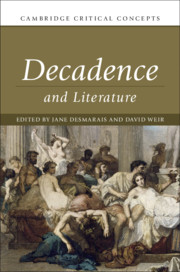Book contents
- Decadence and Literature
- Cambridge Critical Concepts
- Decadence and Literature
- Copyright page
- Dedication
- Contents
- Figures
- Contributors
- Acknowledgements
- Introduction
- Part I Origins
- Chapter 1 Decadence in Ancient Rome
- Chapter 2 Decadence and Roman Historiography
- Chapter 3 Nineteenth-Century Literary and Artistic Responses to Roman Decadence
- Chapter 4 Decadence and the Enlightenment
- Chapter 5 Decadence and the Urban Sensibility
- Chapter 6 Decadence and the Critique of Modernity
- Chapter 7 Decadence and Aesthetics
- Part II Developments
- Part III Applications
- Select Bibliography
- Index
- References
Chapter 4 - Decadence and the Enlightenment
from Part I - Origins
Published online by Cambridge University Press: 12 August 2019
- Decadence and Literature
- Cambridge Critical Concepts
- Decadence and Literature
- Copyright page
- Dedication
- Contents
- Figures
- Contributors
- Acknowledgements
- Introduction
- Part I Origins
- Chapter 1 Decadence in Ancient Rome
- Chapter 2 Decadence and Roman Historiography
- Chapter 3 Nineteenth-Century Literary and Artistic Responses to Roman Decadence
- Chapter 4 Decadence and the Enlightenment
- Chapter 5 Decadence and the Urban Sensibility
- Chapter 6 Decadence and the Critique of Modernity
- Chapter 7 Decadence and Aesthetics
- Part II Developments
- Part III Applications
- Select Bibliography
- Index
- References
Summary
The modern concept of decadence owes its origins not only to ancient Rome but also to Europe and Great Britain during the Enlightenment era, a period notorious for the hedonism and hypocrisy of the aristocracy. The social decadence of the period was reflected in its libertine literature, but there is also a close association between libertine behaviour and enlightenment thought. The term ‘libertine’ can be traced back to such rational, scholarly associations of freethinkers as les libertins érudits, a group whose intellectual and ideological goal was the liberation of society from the strictures of religious dogma and authoritarian rule. By providing a rational basis for immorality, Sade and other libertine authors did much to influence later writers customarily regarded as decadent. Yet despite its comprehensibility and even its power and attractiveness today, Enlightenment decadence thrived within a unique nexus of material wealth, transgressive intellectualism, and politicized eroticism that was very much of its time.
Information
- Type
- Chapter
- Information
- Decadence and Literature , pp. 66 - 81Publisher: Cambridge University PressPrint publication year: 2019
